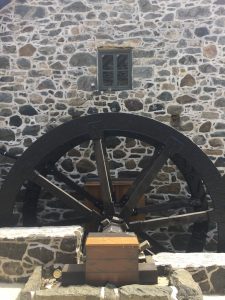Efailnewydd, Pwllheli, Gwynedd, LL53 8TN
Royal Commission reference NPRN 409208. (www.coflein.gov.uk)
Felin Rhyd Hir (Melin Bodfel) is a two-story stone built water-powered corn mill under a pitched slated roof. The composite overshot waterwheel, with cast iron shrouds and hubs, and wooden axle, spokes and buckets, remains in situ on the north west gable wall. It was supplied by a pond to the north of the mill, fed from the Afon Rhyd-hir via a 1.7 km long leat which also captured the tailrace water from Melin Llannor (NPRN 411677) . The corn drying kiln was integral with the mill, at the south eastern end the slatted wooden cupola roof vent is retained. Inside, the mill machinery remains in situ behind the boarded hurst frame, with the cast iron pit wheel and wallower, and great spur wheel on a wooden upright main shaft which drove two pairs of stones. Outside the hurst frame there are iron shafts carrying wooden pulleys to drive the sack hoist and flour dressing machines. On the floor above the stones and their wooden tuns and hoppers remain in position, and the sack hoist spindle is still in situ in the roof space. The millpond remains.
Adjacent to the north-west is the former mill house, now fully restored, which is thought to be earlier than the existing mill.
Felin Rhyd Hir originally known as Melin Bodfel was more recently owned by the Glynllifon estate, however during the 17th century the site was bought in 1671 by a Robert Stapleton. Stapleton sold the site in 1684 to Mr Samuel Hanson a sugar plantation owner in Barbados. Nanhorron Records (XD/101) show the site being rented out by Hanson in 1684 to Mr Robert Griffith. Mr Griffiths continued being the Miller living in the Millers house until 1687 when a Mr Thomas Edwards is shown as renting Melin Bodfel.
Samuel Hanson’s granddaughter Silence Hanson married Thomas Folkes and they became the owners of the Bodfel estate including Melin Bodvel. The site passed to their daughter Elizabeth Folkes who married Sir Thomas Hanmer (1677 -1746) on the 20th February 1724.



